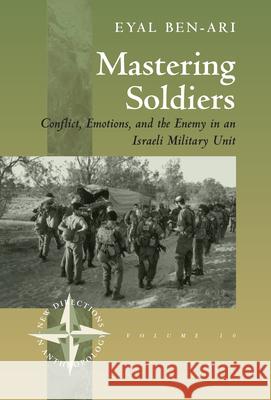Mastering Soldiers: Conflict, Emotions, and the Enemy in an Israeli Army Unit » książka
Mastering Soldiers: Conflict, Emotions, and the Enemy in an Israeli Army Unit
ISBN-13: 9781571811455 / Angielski / Twarda / 1998 / 160 str.
Mastering Soldiers: Conflict, Emotions, and the Enemy in an Israeli Army Unit
ISBN-13: 9781571811455 / Angielski / Twarda / 1998 / 160 str.
(netto: 484,12 VAT: 5%)
Najniższa cena z 30 dni: 498,70
ok. 22 dni roboczych.
Darmowa dostawa!
The insight into soldiers' language a an expression of their understanding of soldiering, citizenship, and manhood that this book] allows, and the inspiration for further inquiry, are ... valuable." - H-Net Reviews (H-War) Studies of the military that deal with the actual experience of troops in the field are still rare in the social sciences. In fact, this ethnographic study of an elite unit in the Israeli Defense Force is the only one of its kind. As an officer of this unit and a professional anthropologist, the author was ideally positioned for his role as participant observer. During the eight years he spent with his unit he focused primarily on such notions as "conflict," "the enemy," and "soldiering" because they are, he argues, the key points of reference for "what we are" and "what we are trying to do" and form the basis for interpreting the environment within which armies operate. Relying on the latest anthropological approaches to cognitive models and the social constructions of emotion and masculinity, the author offers an in-depth analysis of the dynamics that drive the men's attitudes and behavior, and a rare and fascinating insight into the reality of military life. Eyal Ben-Ari is Associate Professor and Chair of the Department of Sociology and Anthropology at the Hebrew University of Jerusalem.
The insight into soldiers language a an expression of their understanding of soldiering, citizenship, and manhood that [this book] allows, and the inspiration for further inquiry, are ... valuable." · H-Net Reviews (H-War)Studies of the military that deal with the actual experience of troops in the field are still rare in the social sciences. In fact, this ethnographic study of an elite unit in the Israeli Defense Force is the only one of its kind. As an officer of this unit and a professional anthropologist, the author was ideally positioned for his role as participant observer. During the eight years he spent with his unit he focused primarily on such notions as "conflict", "the enemy", and "soldiering" because they are, he argues, the key points of reference for "what we are" and "what we are trying to do" and form the basis for interpreting the environment within which armies operate. Relying on the latest anthropological approaches to cognitive models and the social constructions of emotion and masculinity, the author offers an in-depth analysis of the dynamics that drive the mens attitudes and behavior, and a rare and fascinating insight into the reality of military life.Eyal Ben-Ari is Associate Professor and Chair of the Department of Sociology and Anthropology at the Hebrew University of Jerusalem.











